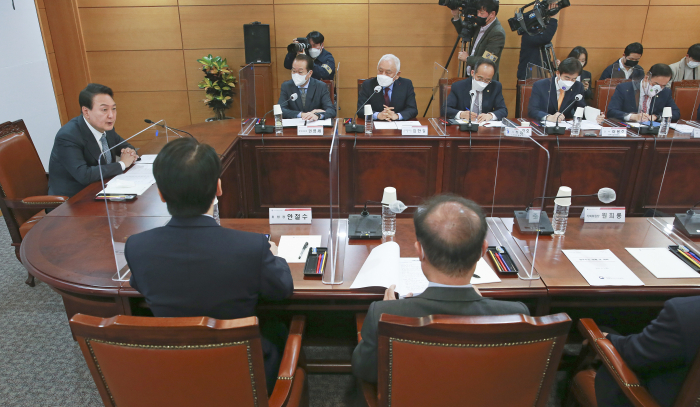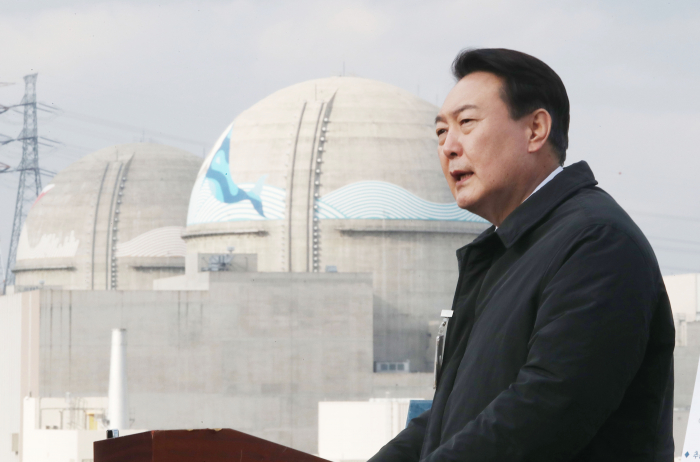Energy
S.Korea to scrap ambitious 2050 renewable energy target
President-elect Yoon's energy policy will be focused on reviving nuclear plants and boosting energy security
By Apr 06, 2022 (Gmt+09:00)
2
Min read
Most Read
LG Chem to sell water filter business to Glenwood PE for $692 million


KT&G eyes overseas M&A after rejecting activist fund's offer


Kyobo Life poised to buy Japan’s SBI Group-owned savings bank


StockX in merger talks with Naver’s online reseller Kream


Meritz backs half of ex-manager’s $210 mn hedge fund



South Korea’s incoming government will scrap the country’s ambitious goals of expanding renewable energy sources to 70% of the electricity supply by 2050, in accordance with its campaign pledge to increase dependence on nuclear energy.
Contrary to the current government's nuclear phase-out plans, President-elect Yoon Suk-yeol’s energy policies will be focused on reviving nuclear power plants and strengthening energy security, according to the presidential transition committee on April 5.
Yoon, who is taking office on May 10, will rescind the outgoing President Moon Jae-in’s plan to reduce nuclear power to 6.1% of energy sources by 2050. Instead, he will support the construction of new nuclear power plants shelved under the current administration and extend the lifespans of the existing ones.
Under the country’s latest five-year energy plan set in 2019, South Korea plans to expand renewables to 30-35% of energy sources and drastically cut nuclear and coal-fired electricity by 2040.
According to the plans aimed at achieving carbon neutrality by 2050, the government has banned the construction of new coal-fired plants and decided to shut down aged coal power plants or convert them into LNG plants. It also plans to finally close down all nuclear plants across the country by 2085.
But the goals were seen as too ambitious and unrealistic to carry out for South Korea, one of the world's largest nuclear power producers.
The government updates its basic energy supply plan every five years. With the next update due in 2024, the incoming administration will first work on a biennial energy supply plan needed to be updated by the end of this year.
“We will bring the country’s energy plans back to the drawing board and set a new biennial energy plan with a focus on nuclear energy,” said an official of the presidential transition committee.

ENERGY SECURITY
To cope with the growing tide of resource nationalism since Moscow’s invasion of Ukraine, Yoon is also considering revising President Moon's energy plan to increase reliance on neighboring countries such as China and Russia.
To strengthen energy security, or increase the availability of energy sources, South Korea will ramp up efforts to further diversify energy sources, bolster ties with energy-producing countries and secure key energy resources.
It will also put more efforts into building hydrogen power infrastructure and developing low-carbon energy generating technologies.
“Nuclear power is a key to increasing our energy independence,” said Jerng Dong-Wook, head of Korea Nuclear Society and professor of Chung-Ang University.
”Restoring nuclear power plants and strengthening energy security are the topics related to each other.”
Renewable energy makes up only 6.7% of South Korea's electricity generation as of November of last year, according to the Ministry of Trade, Industry and Energy.
Until the 2024 general elections, energy is one of the few policy areas where Yoon is expected to make good on his words without support from the parliament dominated by the opposition Democratic Party.
Write to Zi-Hoon Lee at lizi@hankyung.com
Yeonhee Kim edited this article
More to Read
-

-

-
 Business & PoliticsS.Korea's president-elect Yoon vows deregulation, tax cuts
Business & PoliticsS.Korea's president-elect Yoon vows deregulation, tax cutsMar 10, 2022 (Gmt+09:00)
6 Min read -
 EnergyKorea to require power plants to use more renewable energy resources
EnergyKorea to require power plants to use more renewable energy resourcesOct 07, 2021 (Gmt+09:00)
3 Min read
Comment 0
LOG IN


